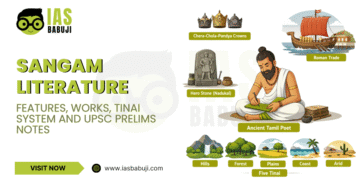Behind every exam, there is a lot of struggle and hard work involved. Further, when we talk about the IAS exam, the first that comes to our mind is the syllabus. Surely, it is one of the toughest exams, and one needs to invest time and effort to clear the exam. To assist you with the exam, we cover all the essential topics for the exam. Therefore, in this article, you will get all information related to the Gig Economy in India, Gig Economy platforms, meaning, and other essential details. So, read the complete article and learn more about the Gig Economy for the IAS exam preparations.

Introduction
To begin with, the Gig economy is a free market in which temporary positions are common, and companies contract with independent workers for short period engagements. According to the Boston Consulting Group, India’s gig workforce comprises 15 million workers employed across industries. As we have mentioned, this topic is essential to understand for the IAS main exam. In addition, it will help you to score for the GS papers. Below understand all the things like Gig Economy meaning and other related things.
Gig Economy Meaning
As mentioned earlier, the Gig economy is a free market system. Further, according to of Boston Consulting Group. It says India’s gig workforce comprises 15 million workers employed across industries such as software, shared services, and professional services. Besides, it is estimated that 56% of new employment in India is being generated by Gig economy companies, consists both the blue-collar and white-collar workforce.
Get the complete information of the UPSC and the IAS exam. Read More. Before applying for the IAS exam, one must know all the things related to it. So go through the links and learn about the vital things.
Why it is important?
Let us understand why Gig Economy is essential from the below points.
- In the first place, with the digital age there is no need for workers sit at one place as the job can be done from anywhere. Therefore, employers can select the best talent available for a project without location constraint.
- With the presentbgenerations you will find different attitudes to careers. Further, they know which type of work is suitable for them rather than having careers that may not satisfy their urgers.
- Also, all kind of jobs offers you with the job training.

Requirements
Further, the code mandates compulsory registration of both gig and platform workers on an online portal. It is essential to register to get all benefits. Below we have mentioned the essential points on the same.
- One must be between 16 and 60 years of age
- Further, one must worked for not less than ninety days during the preceding twelve years.
- Further, Gig worker or platform worker must make an application for registration along with the documents.
- There are some social security benefits to unorganized workers including gig and platform workers.
- Accidental insurance
- Life and disability cover
- Old age protection
- Health and maternity benefits
- Creche
- Further, platforms can claim the benefits that are provided under Social Security Code but cannot claim labour rights.
Pros and Cons
Talking about the pros, it offers workers flexibility, and one can choose to work for various organizations simultaneously. Further, it provides an opportunity for workers to understand their skills in an area. Besides, freelancers writers can try part-time jobs.

Further, with cons, workers may suffer from inconsistent pay and a lack of stability in job tenure. Even though they get the flexibility of work, they may find difficulty with work hours, pricing, etc. Also, they are denied the benefits offered to their regular workers, like health insurance, paid leaves, etc.
Challenges
- In the first place, there is a need for skilled workers. Further, various companies invest money in training employees. A gig woker will have to upgrade his skills on his own at his own cost.
- Further, the Gig Economy is unregulated in nature. It means workers have little job security and few benefits.
- Besides, there is a mismatch of demand and supply. This may get worse over time.
Issues Related
Further, there is no guarantee of benefits. Besides, platforms workers are now eligible for maternity benefits, life and disability cover, old age protection, employment injury benefits, etc. Besides, there is no fixed responsibility as the code states that provisions of basic welfare measures.
Importance of Gig Platform Workers
The Gig Economy is the new concept in India, and gig and platform workers have become a significant part of the economy.
The covid-19 gave realization that gig and the platform workers play a major role as delivery drivers and agents. Further, these workers helped in various platforms during the pandemic. They helped all get the necessities to reach people at their homes. Besides, with increasing urbanization, this sector has high growth potential.
Impact – Gig Economy
We all are aware of the covid-19 impact all over the world. Due to this, businesses got affected, and people were looking for an income source to sustain themselves. Further, the number of Gig workers has grown over the years. It has shown growth in internet companies like Zomato, Swiggy, Uber, Ola, Urban Company, etc. However, it also created new business models to cater to the growing demand requirements. Further, Gig workers provide for a universal minimum wage.
Collar Jobs
- Blue Collar Worker – He belongs to the working class, who performs manual labor and earns an hourly wage.
- White Collar Worker – He is a salaried professional, referring to general office workers and management.
- Gold Collar Worker – these are the workers who are highly skilled and knowledgeable people. Example – Lawyers, doctors, research, etc.
- Grey Collar Worker is the balance of employed people not classified as white or blue-collar. Examples – Police officers, health care professionals, Security Guards, etc.
- Green Collar Workers – these are the people who work in the environmental sectors of the economy. Examples – people who work for solar panels, Greenpeace, World Wide Fund for nature, etc.
- Pink Collar Worker – these are the people who are often women’s work and are often low-paid.
- Scarlet Collar Worker – these people work in the pornography industry.
- Red Collar Worker – these are government workers.
- Open Collar Worker – these are the workers who work from home, especially via the internet.
As a whole, we can say that there is a need for more clarity. To ensure social security, measures are provided to workers. Further, there is also a need for socio-legal acknowledgment.
Conclusion – Gig Economy
The above article gives you details of the Gig Economy, meaning, platforms in India. Further, we have covered all the requirements, challenges, effects, and issues related to India’s Gig economy. Besides, it is one of the vital concepts for the UPSC exam. When we talk about the IAS exam, many things are to be taken care of. Further, in the IAS exam, you will find three-round. In the IAS prelims, there are two papers, and in the IAS main exam. Finally, there will be an interview round. One needs to go through all stages of the IAS exam. Then, to get the best results in the exam, one must study from the standard books. We have added all details on the IAS exam. You can check here for more information. Click Here
Also, find other IAS exam study materials here. To know about the question pattern and other details, one must go through the previous year’s question papers. It will help you understand questions, patterns, marks, trending topics, and other details. Also, you go through some essential exam tips that will help you score good marks in the exam. Finally, try to refer to give mock tests, and it will help you understand your skills well. One needs to visit the official site to get the latest updates on the exam. Good Luck with your exams. It is normal to get tense, but instead, try to make the proper plan and prepare for the exam.

FAQs – Gig Economy
The general workforce environment includes short-term employment, contractual jobs, and independent contractors.
Some of the best jobs are
1. Delivery Driver.
2. Writer/Editor.
3. Accounting
4. Software Developer/IT Consultant.
5. Health and Safety Worker.
Examples of the Gig economy are ride-hailing, food delivery, and holiday rental apps.
Editor’s Note | Gig Economy
After reading the above article, you will get details of the Gig Economy meaning, platforms in India, and Gig Economy Platforms. Further, it is a must for the IAS aspirants to know about these concepts as a part of the IAS exam syllabus. We have covered the necessary details to help you with your exam preparations. As we mention in our article, try to maintain a separate book to write all the essential points. Then, you can study the same during the exam. The above article helps you by providing the necessary details and revising concepts. Revision is the essential thing. You will also find the vital links that will help you with the IAS exam preparations. We wish you Good Luck with the exams.






